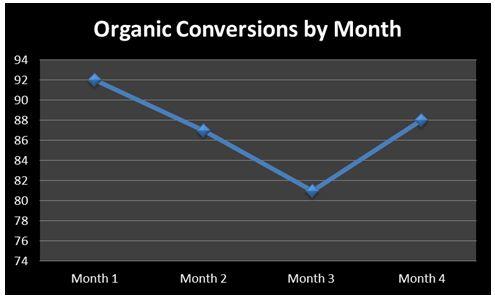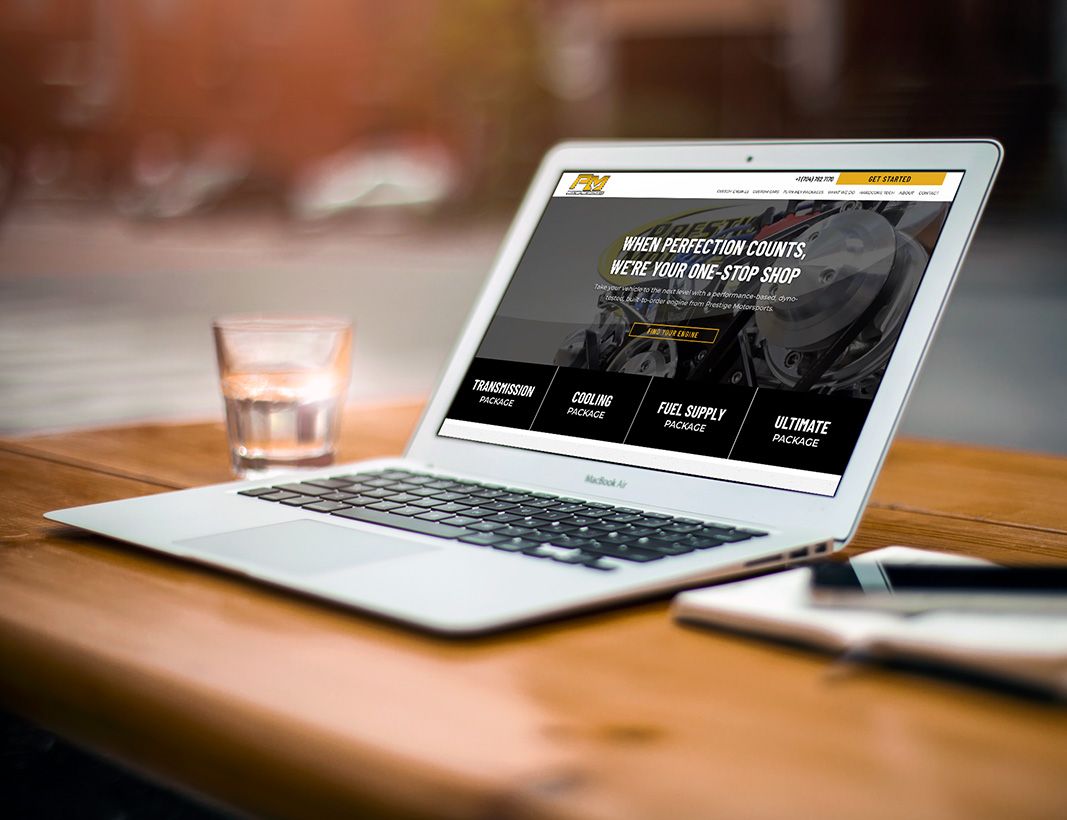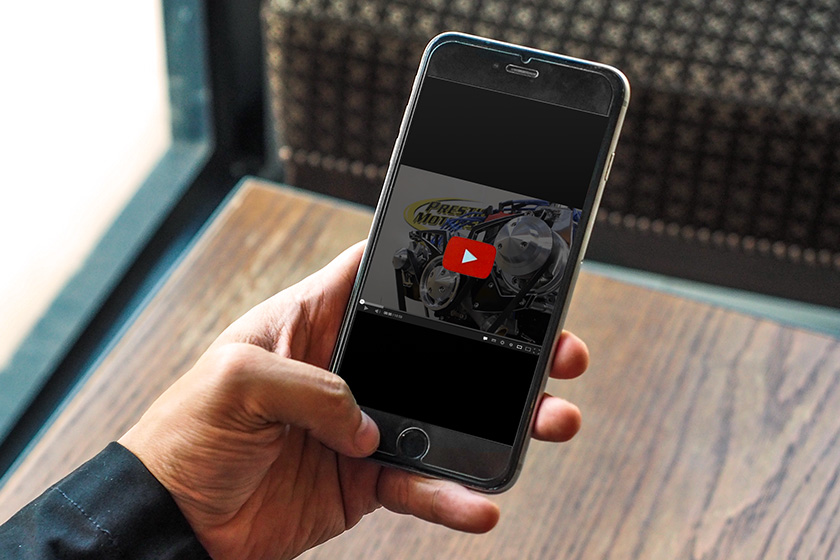Should I bid on my own name or company’s name in my paid search campaign? This is a question I often get from clients. The short answer is absolutely, unequivocally - YES! While I completely understand the trepidation behind thinking one should not bid on their own name ("I already own the organic listings," "Why would I spend money on my own name?" "I would get those clicks anyway."), experts and studies point to the same conclusion – you should bid on your own name in your paid search campaigns.
In this article we are going to address the reasons why it is important to bid on your own name when running a paid search campaign. We will also address the common myths and misperceptions that are spread regarding this important SEM strategy. So let's get started!
Just because you aren't bidding on your own name doesn't mean your competitors aren't.
We were working with a Kia auto dealer client whose biggest competitor was a fellow Kia dealer approximately 20 miles away on the other end of town. The competitor was spending $70k+ per month blasting their message via off-line mediums like television and radio. Our client did not have this kind of budget and needed a way to compete in the marketplace. We noticed that the competition was not bidding on their own name on the search engines. The competition had a number 1,2 & 3 ranking organically so they thought they had it "locked up." By creating a Pay-Per-Click campaign that focused on the competitor's name and the offer details they were running via their off-line media we were able to use their $70K+ media budget against them. Because we were able to track phone calls from the PPC campaign, we were able to determine that more than 40% of our client's leads were coming from their competitor's TV ads.
This case study is one of many proving that if you aren't aggressively bidding on your own name on search engines, you will be sending YOUR potential customers to your competitors. Would you run a TV ad driving customers to your biggest competitors? Of course not!
It's Cost-Effective.
The cost of your own name is usually a fraction of the cost of the rest of the keywords in your campaign.
While the more generic keywords in your campaign are usually the most costly, your brand name is generally pennies-per-click comparably. There are, of course, exceptions to this rule. If you are a Honda dealer and have "Honda" in your name you will obviously pay more than pennies because your competitors are likely broad-matching to the term "Honda." However, even in this specific instance your full name will most often cost less than half of your overall campaign cost per click.
Don't forget, your brand name will almost always cost less for you than it will for your competitors. This will give you the best placement at the best price, especially if your URL is appropriately named.
Some quick math:
The average CPC (cost per click) for a brand name term is very low – averaging about $0.25/click. If you bid on your own brand name terms and are paying this CPC then:
100 clicks per month @ $.25 = $25
500 clicks per month @ $.25 = $125
1000 clicks per month @ $.25 = $250
Even at three times this CPC, which is where that Honda dealer I referred to may be sitting, are you willing to allow users to search for your brand name and then click on your competitor's ad?
Remember all of the dollars you are spending in other mediums to get people to know you, know your name, and then search for you online. If you're spending thousands of dollars on off-line media, why wouldn't you spend at least hundreds to make sure that when they search for your brand name, they find you at the top of the page?
You control the message and landing page, making communication much more effective:
Let's say you've worked hard or hired a reputable SEO company and over time have effectively been able to own the entire first page on Google when someone searches for your brand name. It's likely that many of those pages are to landing pages, Facebook accounts, YouTube videos, and many other off-site URL's. The descriptions on those pages are not going to be communicated as well as a paid search campaign will be.
Here's an example - Let's again use the auto industry since they always have a specific offer or deal to promote. With just a little SEO, a dealer can own the organic listings for their own name on Google; however, many of the pages that will be displayed organically are Twitter accounts, LinkedIn accounts, CitySearch listings, etc. None of these page descriptions have the current APR financing special or current lease promotions that can be communicated in the paid search campaign. It's the PPC ad that is going to entice a user to click through to the site and see what the offer is all about. Let's also not forget that none of the organic links are going to take the user to the offer page. Instead, the searcher will land on a social media account or generic page on the site that has no hook, no offer, and no reason for the user to continue taking action on the site.
With your paid listings you can control the advertising message as well control the exact page the searcher lands on which will lead to higher conversion rates and more customers.
If your organic listings are as dominate as you think then your PPC ad won't cost you a cent.
Clients who have a great organic presence for their own name obviously believe in SEO. And they should...a good SEO strategy combined with a strong SEM strategy is the best way to dominate on the search engines. If your SEO strategy is working and users decide to click on your organic results, you still get the added impressions from your PPC campaign, but you don't spend a cent since the user doesn't click on it.
Since when is an extremely targeted impression not worth anything?
By dominating the paid search for your brand name you get an impression every time someone searches for your name online. Doing this solidifies in the consumer's mind that you are a competent player in the market and places your brand name in a prominent place on the page. EVERY OTHER MEDIA is bought by impressions – TV, Radio, Print, Display, Email marketing, you name it – but for some reason clients tend to forget how important an impression is to their business when it comes to search. It can be argued that a search impression is worth more than any of the others listed above because it is highly targeted to consumers that are actively searching for you. The beauty of it is that if no one takes action (a click in this case) on your ad, then you don't pay anything for it. How would you like that kind of a deal on other media you purchase?
It certifies your authority for your own name.
You've paid for an ad which makes you look like someone who's taking this seriously, not just someone who's managed to get one domain to index well.
It gives you more real-estate on the search page.
Research has shown that customers do expect respectable companies to come-up in the top results of the Google, Bing or Yahoo!
By dominating the paid listings and having good SEO results, you solidify in the consumer's mind that your site is the most relevant place to land for their search efforts. Many times between a good SEM/SEO strategy you can own everything "above the fold," and in some instances own the entire page.
Consumers are looking at (and clicking on) the paid ads.
The charts below show that online searcher's eyes actually spend the most time viewing search engine results pages. It's not difficult to see that the paid search results are the most prominent place people are looking. Did you think it was a coincidence when the search engines moved their results from the right side of the page to the top left?
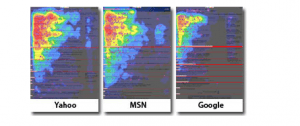
Graphic by Enquiro
Do you want your ad to be in the "hot spot" or your competitor's ad to dominate this position?
Think of your local grocery store. You walk in looking for Sprite. When you get to the end of the isle, you see that 7Up is on sale; you're likely to grab the 7Up, right? Well, if a searcher is looking for you and sees your competitor's ad in a prominent position with a strong retail message, what do you think the odds are that they click on your competitor's ad? According to our research the answer is – very likely.
It helps your SEO efforts.
In a recent study, it was shown that when you add PPC ads to a page where you already dominate for SEO, your SEO conversions can increase up to 15%. This can be related to the fact that once you have gained the share of voice battle, customers are simply more willing to click.
Reputation Management
Let's face it; reputation management is something you need to consider. The trick is to dilute any negative results that may have been placed about your company, diffusing the overall impact of negative comments. If you have a lot of customers, you are bound to eventually get some discouraging and potentially destructive feedback. By having your name in your paid search strategy, you can steer potential consumers to see what you need them to see on search engines and successfully manage your online reputation.
Look to the Experts
If you search for Apple computers, Microsoft, Amazon, Wal-Mart, etc. you will find that not only do they dominate the organic rankings, but they are spending big money to show up in the paid search results for their own name. If it wasn't profitable, do you think they would be doing it? One of my favorite examples of this is the screenshot below where Bing! is bidding on their own name when you search on Google (and they own the organic listings for their own name). Need I say more?

Study after study shows that bidding on your own name increases traffic and profits.
While there are many studies that prove this, one of my favorites comes from Daniela Araujo at Thoroughly Modern Marketing. (See Full Article Here) The way this experiment was conducted is solid and the results are obvious.
Direct Excerpt from The Study:
I. The Experiment
I measured organic and paid monthly stats before and after we paused the paid Branded Campaign. In the first half of the four month experiment, all five campaigns were running. The Branded Campaign had 100% impression share and branded ads were shown not only for users searching for the client's brand name but also for search phrases that included the client's branded name. In the second half of the experiment we paused the Branded Campaign for two months leaving all the other non-branded campaigns running. Finally I averaged out trends from the first half and second half of the experiment and then compared results.
II. Results
PPC Campaign
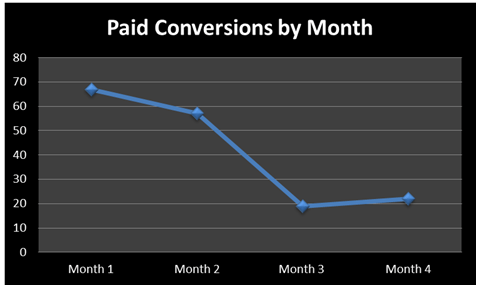
- Monthly average number of leads dropped by more than 65% after Branded campaign was paused.
- Monthly average conversion rate dropped by more than 35% from 5% in Month 1 and 2 (Branded Ads on) to 3% in Month 3 and 4 (Branded ads off). Branded Campaign in Month 1 and 2 was responsible for not just nearly half of all total paid leads but also all targeted traffic.
- Monthly average number of clicks decreased by more than 44% from 1,196 in Month 1 and 2 to 596 in Months 3 and 4. Consequently monthly average CTR decreased by 40% from 3.35% to 2% after branded ads were paused.
Organic
- Monthly average traffic (Months 3 and 4) increased by only 173 visits after PPC Branded Campaign was paused.
- Surprisingly, monthly average conversions decreased by 7.5% and conversion rate decreased by 14% after Branded Campaign was paused during Months 3 and 4.
The organic results were disappointing because we were expecting traffic and conversions to shift from Paid to Organic. Instead, conversions decreased from 90 to 83 and traffic increased by only 173 visits. By pausing the Branded Campaign, we lost about 40 leads and 400 visits in a period of 2 months.
III. Bottom Line
In this experiment, I demonstrated that the Branded Campaign dramatically boosted performance for both Paid and Organic search results. Similar results are likely to be true for most accounts, however they can vary depending upon unique factors – e.g., your brand popularity and site navigation usability.
This study answers that myth - "I would get those clicks anyway." You can see by the research that they did not get "those clicks." By taking their name out of their PPC strategy, it negatively affected their overall traffic, sales and profitability.
My grandfather always used to say, "The proof is in the pudding!" So grab a spoon and start scooping up all of the information in this article to help you understand the best strategy for your paid search campaign - including bidding on your own name/company name.
Written by Jerry Schroeder
Jerry Schroeder is an SEM expert with over 18 years of marketing experience. Jerry is owner of enCOMPASS Advertising Agency located in Cornelius, NC. This email address is being protected from spambots. You need JavaScript enabled to view it. . #jshray
Special Thanks to Channel Advisor Blog, Thoroughly Modern Marketing, and Marketing Gumbo for their contributions to this article.
Related articles for this subject:
The "I Never Click on Those Links" Myth: http://www.bnrbranding.com/blog/item/60-i-never-click-on-those-links.html
Why You Should Bid On Your Own Name: http://www.nathanhanks.net/localsearchmarketing/should-i-bid-on-my-business-name/
Why Should You Bid On Your Own Brand: http://www.tmmpdx.com/should-i-bid-on-my-own-brand-part-i/
Why Should You Bid On Your Own Brand Part 2: http://www.tmmpdx.com/paid-search-campaigns-should-i-bid-on-my-own-brand-part-ii/
Google Weighs In: Should You Bid on Your Own Brand Name?
http://www.searchmarketing.com/searchmarketing/2011/08/google-weighs-in-brand-name-searches.html
SHARE THIS ARTICLE:




